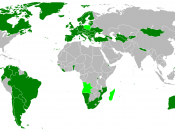The death penalty has been seen as a human rights issue as some regard it as 'cruel and degrading' treatment of individuals. This essay will concentrate on three out of the nine safeguards that are in place to protect those facing the death sentence. It will be argued that, in relation to the U.S.A, these safeguards are ineffective in practice. In some instances, U.S domestic law rather than the safeguards offer more protection, and in other instances, the Supreme Court plays a crucial role.
Human rights are viewed by many as rights that are held by everyone simply by virtue of being a human being. Their foundation stems from the view that all individuals are equal, and that there are certain rights that everyone should have. In any discussion on human rights, the Universal Declaration of Human Rights is of great importance. Its signing in 1948 by the United Nations (UN) marked the 'true start of the international protection of human rights.'
The Declaration was a response to the atrocities committed during the Second World War. The Declaration set out fundamental rights; these included the right to life and freedom from torture. These two rights are of vital importance in relation to the death penalty. The problem though, is that the UN Declaration was not binding in law, it had to be ratified by a country for it to be binding. However, that country may exclude from ratification any Articles or Protocols with which it does not agree.
Amnesty International (A.I.) is strongly opposed to the death penalty; they feel it clearly violates fundamental human rights. Amnesty International is a non- governmental organization (NGO). NGO's concentrate on making reports on specific countries, on specific issues and they also propose legislation and recommend international standards. A.I. has been campaigning for the...


